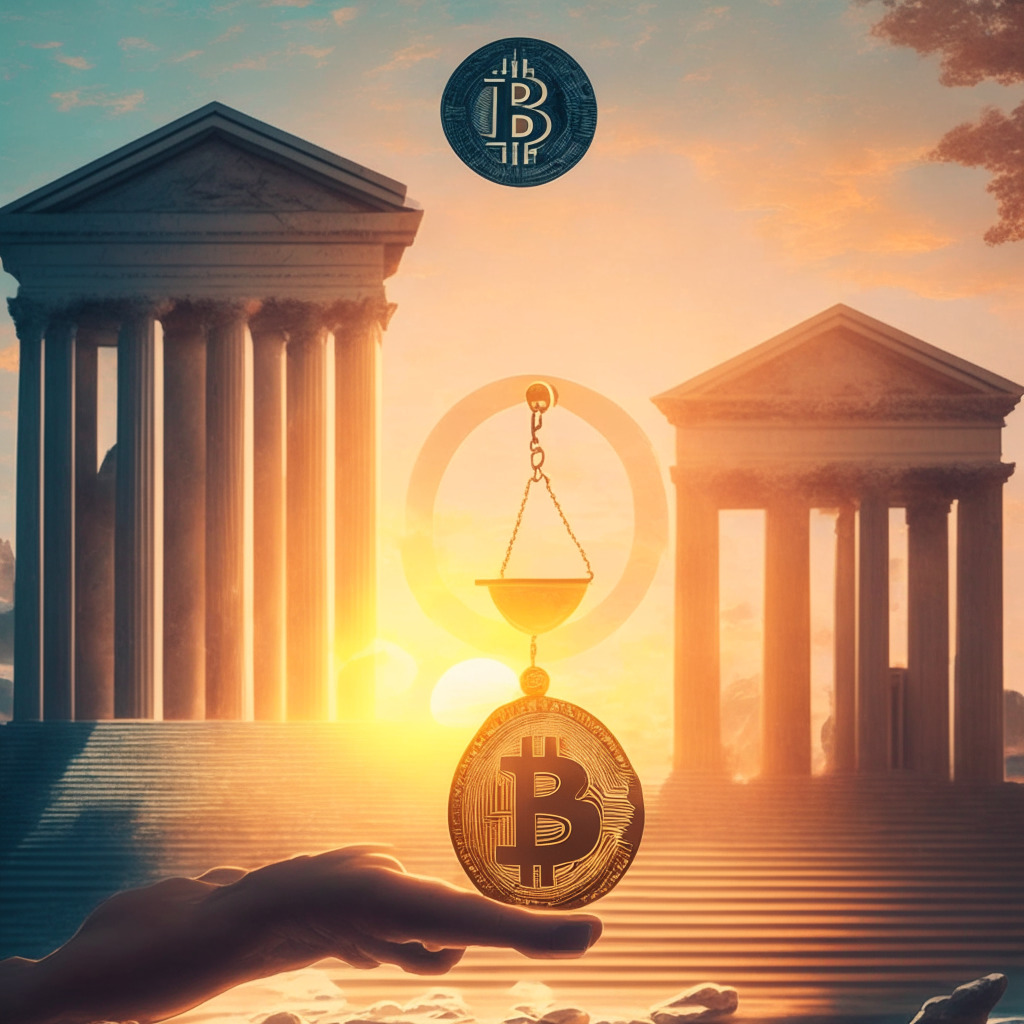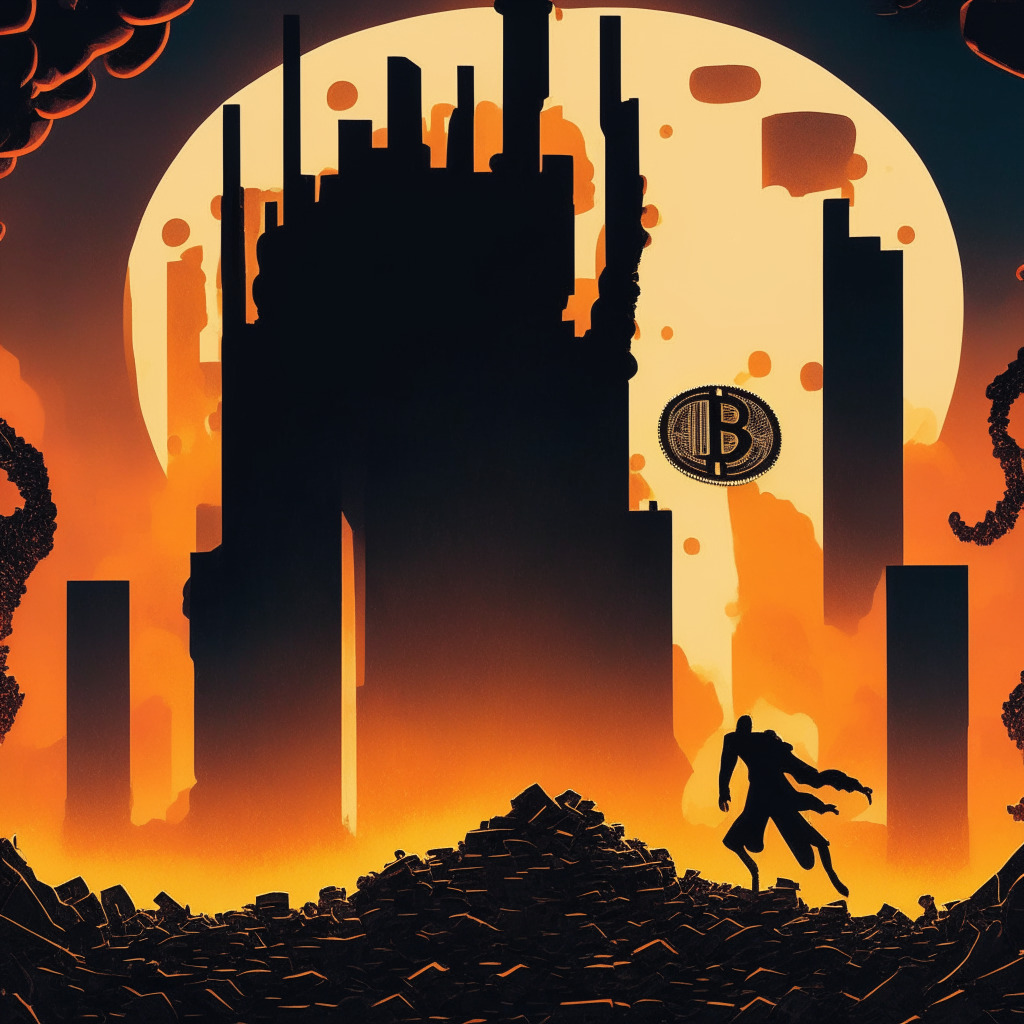“Analysts reveal ‘de-pegging’ is more common in stablecoins USDC and DAI compared to Tether and Binance USD. While stability ideally requires good governance, collateral and reserves, market confidence and adoption, USDT has shown steadiness despite mainstream scrutiny.”
Search Results for: tether
Binance’s Zero-Fee Expansion: A Strategic Move or a Response to Regulatory Hurdles?
“Binance expands its zero-fee trading to Argentine, Brazilian, and South African currency spot trading pairs. This move is seen as an attempt to increase trading of prominent cryptocurrencies against mentioned fiat currencies, despite confronting legal and regulatory hurdles, especially in the U.S. and Europe.”
Navigating Binance’s Controversial Actions: Million Dollar Refunds and Rug Pulls Fallout
“Binance plans to refund 887 users who were unable to redeem their staked CYBER tokens due to borrowing by opportunistic traders during a liquidity crunch. The compensation includes 800,000 USDT and 871 CYBER in staking rewards, along with 200,000 USDT worth of vouchers from CyberConnect Foundation. The incident has led to a discussion on better safeguards and decision-making processes in crypto exchanges.”
XRP’s Price Slump: A Temporary Downturn or an Alarming Trend?
“XRP’s price has seen a slump, reflecting a generally pessimistic atmosphere in the crypto market. Despite setbacks, XRP’s year-to-date gain of 46% remains, bolstered by Ripple’s win in its SEC case. Although recently slipping below the $0.50 support line and experiencing market turbulence, the potential for XRP recovery looks promising.”
Bitcoin vs. Ethereum: The Race Tightens Amid Market Lull and Regulatory Rumbles
“The crypto market leader, Binance, remains dominant despite regulatory concerns, with its bitcoin-tether pair contributing up to 86% of global transactions. Meanwhile, crypto analytics firm K33 predicts ETH will outpace Bitcoin in the next two months, while SOMA Finance is set to introduce the first legally issued digital security.”
Crypto Exchanges and Bitcoin: A New Strategy or a Conflict of Interest?
Bitfinex, a renowned crypto exchange, is reportedly keeping Bitcoin on its balance sheet, potentially converting a portion of trading fees into the cryptocurrency. This strategic move indicates an endorsement of Bitcoin’s long-term value and shows strong belief in cryptocurrencies. However, concerns have been raised over potential market sway and fairness issues.
Foreseeing a Bitcoin Crash: Comparing Cryptocurrency Trends and Future Stability with Stablecoins
“An ominous Bitcoin price metric that previously resulted in a -25% FTX crash is repeating, centred around the BTC rate of $25,726. Market spectators prepare for a possible drop to $23,000. The Short to Long-Term Realized Value (SLRV) ratio indicates potential sales growth in ‘older’ Bitcoins, urging caution among investors. Meanwhile, stablecoin Circle’s USD Coin (USDC) now supports smooth transitions to Base and Optimism networks.”
Crossing Bridges: USDC Expansion to Base & Optimism Networks – A Milestone or Misstep?
In a significant development, USD Coin (USDC) has expanded to Base and Optimism networks, allowing Coinbase and Circle account holders to directly transfer their USDC stablecoin to Base. However, the new native USDC struggles with full integration across networks, causing user confusion and scepticism. The future of this decentralized currency hinges on balancing innovation, competition, and user convenience.
Sybil Attack on Connext Network: Exploring Security vs Convenience in Decentralized Trust Systems
The Connext Network, a protocol for native blockchain bridges, recently endured a ‘sybil attack’— a suspicious wallet exploited the protocol’s token airdrop, making over 200 claims. This unexpected event underscores the critical balance between security and convenience in decentralized trust systems.
$40 Million Crypto Heist: Stake.com’s Unprecedented Security Breach and Quick Recovery
Stake, a popular crypto betting platform, suffered a shocking $40 million exploit in early September, starting with irregular transactions. Despite the massive security breach, Stake assured users that funds would be protected and possibly restored soon, reaffirming the resilience of some crypto platforms.
Crypto Market’s Complex Dance: The Rise of Deribit and Shifting Investor Sentiments
“The crypto market performance has been tepid this week with Bitcoin staying below $26,000. Despite SEC revisiting its denial of Grayscale’s ETF bid, other application avenues remain restrained. Deribit, a crypto derivatives platform, saw a 17% surge in trading volume, indicating strong activity in the global crypto options market.”
Unraveling The Stake Crypto Casino Hack: Speedy Recovery vs Security Concerns
Stake, a crypto casino, recently experienced a high-profile hack, with an alleged $41M stolen from its hot wallets. Despite this, Stake resumed all services in under five hours, raising questions about transparency during security breaches and adequacy of current security protocols.
Nigeria Surpasses U.S in Crypto Knowledge and Adoption: A New Frontier or Regulatory Challenge?
The report by YouGov and ConsenSys confirms Nigeria’s emergence as a leading crypto-savvy nation, beating the US and several European countries in digital asset knowledge and intended investment interest. With a crypto awareness of 99% among Nigerians, up to 70% comprehend the value and mechanisms of blockchain technology. A significant 90% of participants expressed pan to invest in digital assets within the year, despite the national bank’s unclear stance on crypto.
Unraveling TRYB: The Turkish Lira-Pegged Stablecoin’s Unprecedented Rise and Lingering Controversies
“Emerging from traditional U.S. dollar-pegged digital assets is TRYB, a new stablecoin backed by the volatile Turkish lira. Issued by the Turkey-based fintech company BiLira, this Ethereum-based stablecoin offers a unique transactional instrument for users, navigating around fiat counterparts’ volatility. However, suspicions surround its operations, and the stablecoin’s path is marked with both opportunities and skepticism.”
Beyond the $740 Million Scandal: The Tangled Web of Traditional Finance and Cryptocurrencies
The scandal involving Singapore’s largest money-laundering case, featuring the clandestine conversion of wealth into luxury goods and Tether stablecoins, underscores both the potential abuse of cryptocurrencies and the urgent need for robust regulation in the crypto industry. This case emphasizes the complexities of monitoring financial crime and calls for continuous vigilance, transparency, and strong governance within the crypto and broader financial landscape, especially moving towards a blockchain-powered future.
Dismantling Binance USD: Unveiling Binance’s Plan to Cease Support for its Stablecoin by 2024
“Binance cryptocurrency exchange plans to remove eight Binance USD trading pairs from its platform, suggesting it could cease support for the stablecoin by 2024. This stems from allegations that the stablecoin’s issuer, Paxos, produced an unregistered security. Concurrently, competitor stablecoin Tether witnesses market growth.”
Crypto Commodities: Bitcoin and Ether and their Legal Status in US Courts
U.S. District Court Judge Katherine Polk Failla recently referred to Ether and Bitcoin as “crypto commodities,” dismissing a lawsuit against decentralized exchange Uniswap. The legal classifications of cryptocurrencies continue to vary, with other digital currencies such as XRP classified as a security. Amidst conflicting views, U.S. lawmakers are yet to determine whether SEC or the CFTC will have authority over digital assets. Specialists suggest these legal classifications are crucial for creating a more organized and regulated crypto environment.
Navigating Cryptos: Dissecting Asset Handling Strategies from Hodling to Active Trading
“In the uncertain cryptocurrency landscape, experts suggest understanding basics before making bold decisions about investing or trading. Some suggest self-custody for asset control, while others trust institutions like Coinbase. Diversification, focusing on long-term over short-term fluctuations, and safety tools like stop losses are also recommended. Holding on to large-cap cryptocurrencies and using hardware wallets for secure long-term storage are considered safest.”
EOS Gains Ground in Japan: An Underdog Cryptocurrency’s Resurgence and Its Implications
The EOS Network has received endorsement from Japan’s cryptocurrency authority, granting EOS token rights for trade against the yen on Japan’s regulated cryptocurrency exchanges. EOS Network Foundation CEO, Yves La Rose, views this as a unique opportunity for EOS to grow within a regulated market known for stringent transparency. This development also opens up potential for game tokenization, an untapped sector in Japan.
Binance Quietly Removes Banco de Venezuela: Blockchain Freedom Versus Economic Sanctions
Cryptocurrency exchange Binance has silently removed Banco de Venezuela from its P2P service list, mirroring U.S Treasury-imposed financial sanctions. The move raises concerns among Venezuelan crypto enthusiasts, notably because the bank plays a crucial role in Venezuela’s digital currency ecosystem. Despite the silent removal, users can reportedly circumnavigate the ban due to the P2P nature of the services.
Evergrande Crisis: A Turning Point for Crypto Markets or Catalyst for Chaos?
“The escalating Evergrande bankruptcy saga could instigate global economic turbulence and affect crypto markets, potentially causing a price plunge. However, this could be an opportunity in disguise, as cryptocurrencies, due to their volatility, limited supply, and independence, could prove useful in crisis periods, drawing attention to the merits of decentralized finance solutions and blurring the line between traditional and crypto economies.”
Binance Regulations and Its Impact on Russian Cryptocurrency Traders: An Analytical Perspective
“Binance introduces new P2P trading restrictions specifically targeting its Russian clients, limiting them to only using the Russian ruble. While narrowing choices, this strengthens local control over RUB in the Russian crypto sphere. However, Russians abroad face difficulties as their usage of other currencies has been banned on the platform.”
Biden’s Crypto Tax Regulations: A Threat to Innovation or a Step Towards Transparency?
“Recently, the crypto market experienced a significant ripple due to new proposed crypto tax reporting regulations by President Joe Biden. Critics argue these regulations could stifle innovation and make crypto firms reluctant to operate within the United States.”
Dancing on Shifting Sands: Crypto Companies Adapt Amid Regulatory Obstacles and Market Developments
“The crypto industry is witnessing significant developments like Coinbase and Circle’s consortium dissolution, Binance.US’s collaboration with MoonPay, and customer withdrawal issues on the main Binance platform. These changes highlight the dynamic adaptations adaptive to changing regulations, representing both intriguing possibilities and cautionary tales for the industry.”
PayPal’s PYUSD Stablecoin: A Turbo Boost or Damp Squib for Crypto Adoption?
PayPal’s recently launched stablecoin, PYUSD, appeared to have a slow start with 90% of it residing in Paxos Trust’s reserves and only 7% on crypto exchange wallets. However, despite the somewhat sluggish kick-off, it’s still early days; a shift in the crypto market could significantly change PYUSD’s future prospects.
Weathering the Storm: How Exodus Survives and Thrives Amid Crypto Ebb and Flow
“Despite a bearish market, multichain wallet Exodus reported Q2 2023 revenue of $12.4 million, a modest 4% dip year-over-year. Notable was a strong fiat onboarding revenue increase, up 220% from 2022. High trade volumes came from Bitcoin, Tether and Ether. Strikingly, Exodus alleviated some financial stresses by drastically cutting administrative and marketing budgets by 65%, resulting in administrative expenses shrinking to 32.2% of revenue.”
Navigating the Tokenization Wave: Growing Value and Unique Challenges in Blockchain-based Assets
Tokenization uses blockchain to monetize tangible and intangible assets, making them tradable and transparent. Despite cryptos’ ridicule for lack of tangible value, blockchain’s potential to transform assets is increasing. There’s even exploration of derivative, swap, and fixed income security systems. Companies like Pendle Finance and Dinari are demonstrating this potential, while concerns rise about tokenizing user engagement. Elsewhere, Central African Republic is aiming to tokenize its fiat money, a move that could inspire other countries.
Prosper or Perish: The Fine Line Between Innovation and Mistrust in the Launch of Patricia Token
Patricia, a Nigerian cryptocurrency exchange, has launched its native token, Patricia token (PTK), aligning with the mainstream trend of cryptocurrency adoption. However, the move has raised suspicion due to prior issues with fund accessibility, absence on major crypto aggregators, and the planned conversion of outstanding balances to PTK without customer consent.
Navigating Binance.US’s Bold Transition from USD to USDT Amidst Regulatory Challenges
“Binance.US, amid banking challenges, partnered with MoonPay, replacing USD with USDT, turning the exchange into a cryptocurrency-based platform. While facing regulatory scrutiny, it suspended fiat withdrawals and transactions, indicating a retreat from traditional financial systems. The switch raises questions about future banking.”
Navigating the Crypto Winds: The Highs, Lows and Ambiguities in Blockchain’s Future
“Unstoppable Domains has unveiled Unstoppable Messaging, a product of the Web3 messaging network XMTP. Meanwhile, Binance.US has paired with MoonPay to allow customers to convert USD into tether (USDT) amidst their comeback from a dollar deposit suspension. Despite advancements, cybersecurity challenges persist in the blockchain world.”
Unveiling the Truth: How BlackRock and Government Regulations Impact Bitcoin Prices
This article discusses theories around sudden Bitcoin price drops, with factors like governmental regulations, exchange manipulations, and whale movements. It highlights the speculation around BlackRock’s influence on Bitcoin’s price, possibly benefiting from reducing Bitcoin’s price before launching its own Bitcoin ETF. However, it emphasizes that such theories often disregard the complexity and evolving nature of the cryptocurrency market.
Coinbase and Circle Redefine Ties Amid Revised Stablecoin Structure: Exploring the Implications
Coinbase has taken an equity stake in Circle amid a halt in the USDC Centre Consortium’s operations, due to a more regulated environment, removing the need for a separate governance body. Circle will now be responsible for regulatory compliance and controlling the stablecoin’s smart contract keys, while plans are underway for USDC’s expansion onto six new blockchains.































